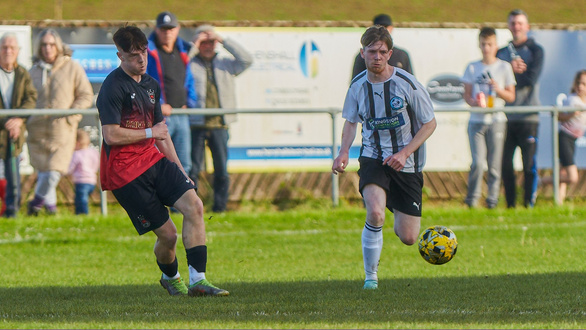Blog
Click image to view full story
Pictures
life after the academy
Shrewsbury Town - A club that goes beyond with their post-academy
aftercare
24/11/23

Shrewsbury Sports Village
Midlands based club Shrewsbury Town FC are a League One side that pride themselves on their academy.
In the last 18 months over 15 players from the academy have made first team debuts across the football league fixtures, FA Cup, Carabao Cup and the Bristol Street Motors Trophy matches.
Despite this, only a handful of these young scholars go on to earn first team professional contracts for the club leaving many stuck at a crossroad.
To help these players find their next steps is a team of staff, headed up by player care officer Natalie Wood, she explained the first steps of the process:
“With the players it a process, over the year there will be release points.
“My role is to ensure I offer support whether that is bringing in speakers, offer workshops in order too show the players what’s available to them.
“The LFE and the PFA they all work together with myself and safe guarding to ensure that the pathway and the transition is as smooth as a process as possible.”
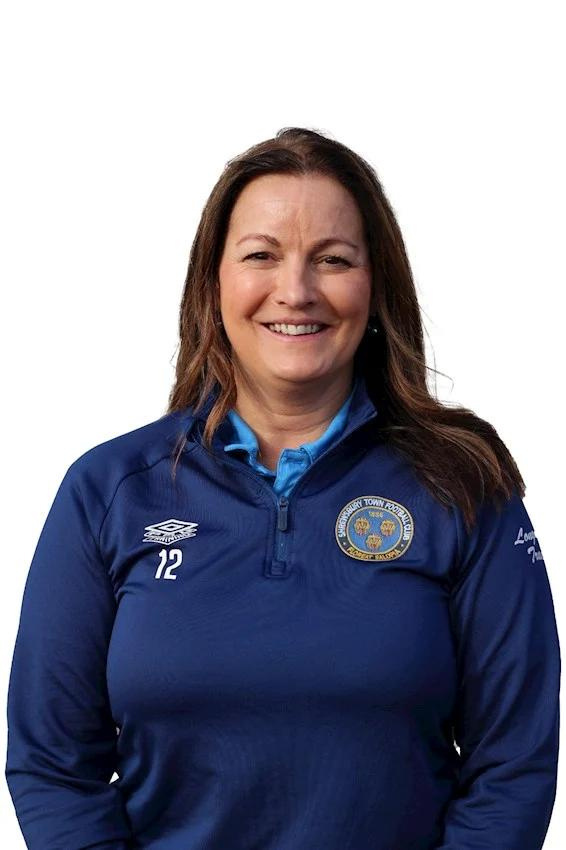
Natalie Wood - Picture by Shrewsbury Town FC
For many of these academy players have spent much of their lives within the academy system, however, as many as 11,000 players aged between 8–18-year-olds get released nationally each year and this can have many effects on the players.
Despite Shrewsbury offering a number of options of player care for their young players Wood admitted it’s a part of the professional game that is still in its infancy.
“Player care is something still in its infancy, we are still on this upward curve and learning every day, many clubs are working together through player care hubs.
“We often all meet up to discuss the next steps and how we can improve further, we have different external groups that come into these meetings and offer presentations to show us what further available to help support these young players.”
However, it’s an area all clubs are looking to develop further and as quickly as possible.
“In terms of other clubs, we’re all on the journey together, some clubs are providing perhaps more support than others, however from what I’ve seen there is some really good work being done.”
life after the academy
28/11/23
The football academy system in the UK is run by the Football Association (FA) and the English Football League (EFL), these bodies work closely with clubs to help produce home grown talent nationwide.
Academies are categorised into four types of Category 1 (Cat 1) through to Category 4 (Cat 4), Cat 1 tend to be Premier
eauge clubs or teams recently at that level, they are the highest ranking academies based on facilities and resources within the academy.
This is a result of millions of pounds worth of funding allowing for top level coaches, as well as first class facilities including dedicated academy specific pitches usually both indoor and outdoor.
Cat 2 academies are similar to that of Cat 1, each year they process 100s of players not just within the academy but through other development centres nation wide allowing them to unearth and develop the best talent nationally and even, internationally for Cat 1 academies.
However, in contrast to the academy specific training facilities and high-level funding in Cat 1 and 2, Cat 3 and 4 is very different, they often use shared community facilities such as sports centres and university sites as well as having much fewer staff and coaches within the team.
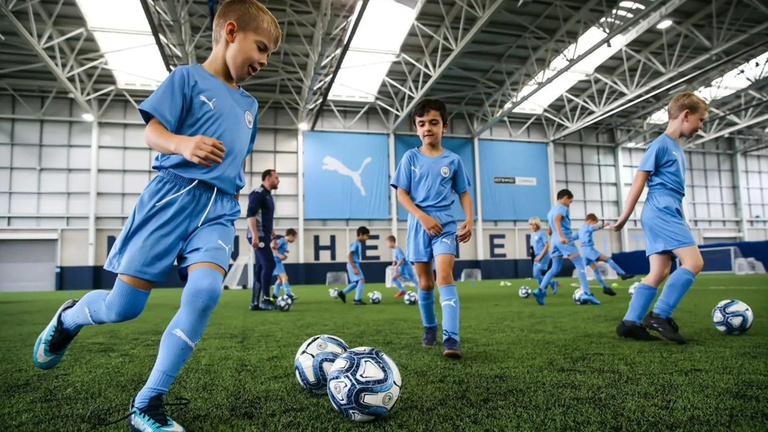
The Foundation Phase - Picture by Manchester City FC
What is the Academy System?
All academies have a ‘Performance Pathway’ which features three different phases and focuses, the Foundation Phase is Under 9 to Under 11 where enjoyment is vital alongside developing key ball skills.
The next phase is The Youth Development this for Under 12s through to Under 16s where greater focus is placed on preparing players for high level football both technically as well as tactically.
And the final phase is Pro, this is where the academy player has reached scholarship level with the aim of reaching the first team of the academies club.
Each year 100s of young players with big dreams get scouted for these academies however it does not guarantee a career in professional football, each season as many as 12,000 young boys are signed to academies but as little as 1% of these goes on to sign professional contracts in the Premier League.
life after the academy
30/11/23

Remy Coddington
“The academy system is failing”
Remy Coddington has grown up on the football pitch, as a teen he joined the Bournemouth academy before moving on to West Ham United for his scholarship at 16 where he played for three years before asking for his contract to be terminated.
Typically, within the academy process as you get closer to the first team you have meetings with academy staff and coaches to discuss your progress, contracts and where the future may potentially lie.
However, Coddington’s journey within West Ham academy was quite different, an injury hit scholarship season left the attacking player frustrated and losing hope of a dream that once dominated his day-to-day life, he explained how
frustrated he was left feeling.
“From my perspective they instantly wanted me back playing how I was before my injury (torn hamstring resulting in 8 months out), they didn’t give me lots of time to build up.
“Quite quickly when I was beginning to play again and feature, I got the feeling they were done with me and had given up on me within the squad which was extremely tough to take.”
Despite this setback Coddington was offered a one-year extension to his contract allowing him to make the step up to the Under 21s however, he believes as a result of his injuries in the previous season he wasn’t allowed a fair chance to
show his skill.
“It never really got started at u21s, I did get to show my skills because I missed the previous season of u18s, so I wasn’t seen or supported.
“As I got fit, I didn’t receive the opportunities that I believe everyone else got which was hard to take after working so hard to get back fit.”
The 7 capped Bermudan international quickly asked to be released from his contract as frustration and disappointment
grew.
Despite admitting he was supported by the club with offers of trials and opportunities following his departure he didn’t feel the opportunities would have ever led him to a contract at another professional club.
However, Coddington passionately believes that this wasn’t down to the club itself but more the failing of the system: “The real problem isn’t the coaches, the problem with the academy system is the academy system itself.
“The coaches are just people who come in do their job, a great job, the actual problem with the system and how it is not conducive to young people, once you fall out of it even for just a short period of time its nearly impossible to get back in.
“I’ve been in the academy system for years and I can’t even put my finger on what the key issue is, but I feel failed, and I know a lot of other players that do as well.”
This summer the exciting attacker moved into non-league as he believed it offered him the best pathway back to professional football as a result of the ‘politics’ involved in the professional game.
When pressed on what he meant by ‘Politics of the academy’ Coddington cut a frustrated figure as he quipped that: “You could literally be as good as Phil Foden but if the politics are against you, you have no chance of making it.
“I know so many players that I’ve played with and against that weren’t liked by say the Academy Manager or Head Coach and they had enough of the effects it had on them, and they ended up leaving the game which is devastating as there was definitely Premier League talent there.”
Remy Coddington isn’t the first and definitely won’t be the last to leave the academy system feeling disappointed and angry by the experience he has had, but for a player to leave by choice as he believes the system is failing represents a key issue potentially developing within.
life after the academy
“We got the same email as the Under 9’s and we were gone”
5/12/233

For Bradley Smith his academy journey was quite different to most, he wasn’t released because of performances or ability but following relegation the academy was folded.
When the 19-year-old centre half was just about to begin his scholarship as a 16-year-old Yeovil Town suffered relegation to the national league resulting in huge losses for the club.
As a result of this the club took the tough decision to shut down their academy, releasing all players from under 9s through to under 18s.
A heart wrenching moment for Smith who chose to leave Swindon Town despite being offered a new contract because of the near 3 hour each way journey from his home town of Swanage.
To move to the much closer Yeovil Town on the promise of a two-year scholarship followed by a one year professional contract.
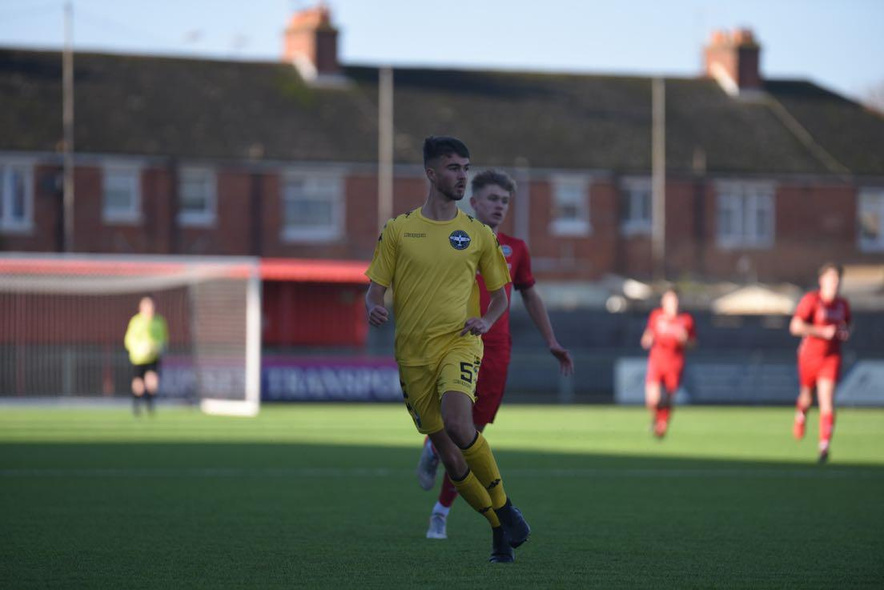
Smith featuring for Eastleigh FC
Smith described the experience: “It was tough, we had been promised so much, and then suddenly they got relegated and we got the same email as the Under 9’s.
“After that we didn’t hear anything again, we were gone.”
Since then the impressive centre back had trials at multiple academies but found a home at Eastleigh FC, there he undertook a two-year scholarship before signing of their Elite Development Squad.
Since then he’s moved into education full time, while captaining Dorchester’s Under 23 side as well as playing for his home club Swanage Town and Herston.
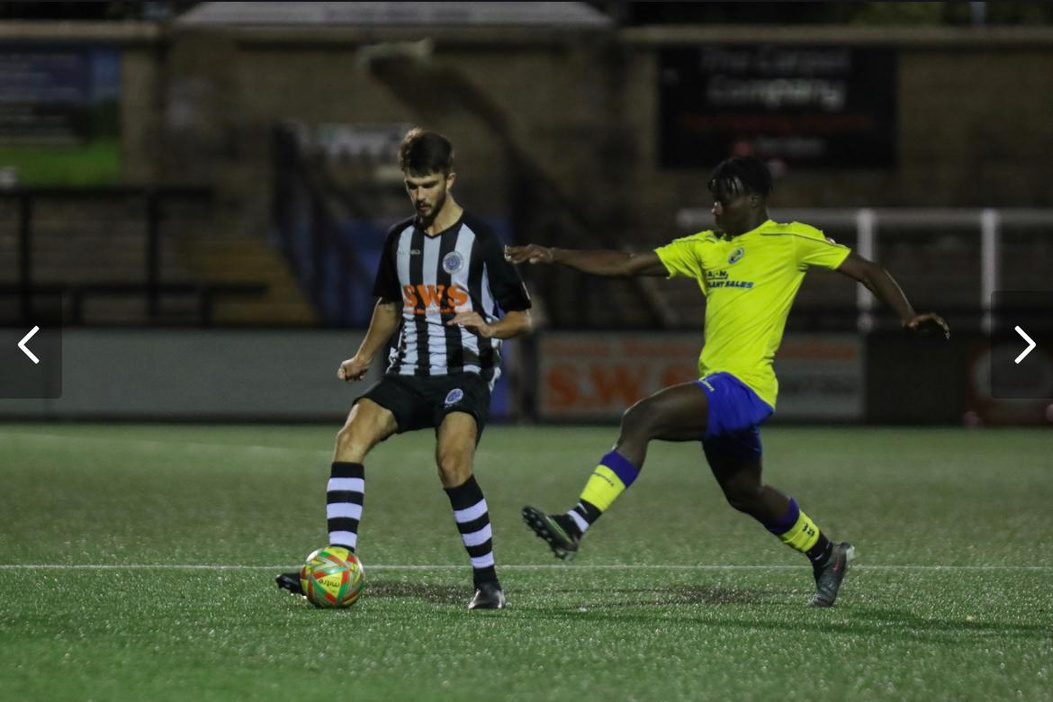
life after the academy
“Its not what you know, it’s who you know”
8/12/23
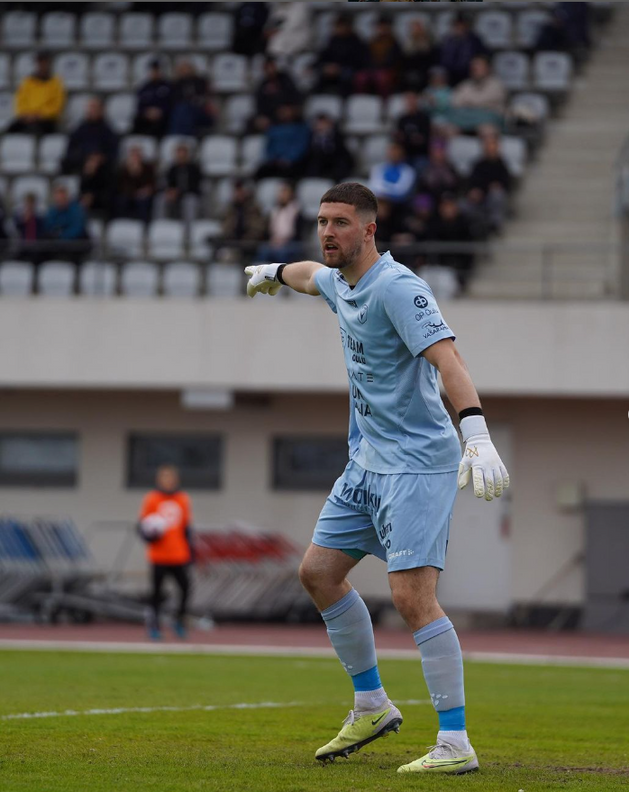
Ward playing for Olou FC
For Ex AFC Bournemouth academy graduate Calum Ward his journey in the professional game is very different to others.
After 10 years within the system at the south coast club, and a two year professional contract he was told his time was up and he could leave.
With just 6 months remaining on his contract Ward was desperately searching around for a loan move and an opportunity to prove himself and he found this through 1st choice keeper at the club Asmir Begovic, a highly experienced international goalkeeper.
“It’s always that saying it's not what you know it's who you know, Asmir obviously being such an experienced keeper knows so many people and he know the goalkeeping coach at Helsinki.
“The manager of the team at Helsinki also knew Jack Stacey (Bournemouth right back) and it all just came together and intertwined perfectly.
“It's pretty mental how it all worked out and being here still, four years later but that’s football.”
life after the academy
10/12/23
One year into the Professional Football Association’s new Safeguarding strategy to build a safer academy culture, Matthew Dunster investigates why the changes were essential.

Ex Swindon Town, Yeovil Town and Eastleigh FC academy player Bradley Smith in action for Dorchester Town FC
Photograph: Dorchester Town
“Quite quickly, when I was beginning to play again and feature, I got the feeling they were done with me and had given up on me within the squad which was extremely tough to take.”
Bermudan international Remy Coddington’s story of life in a professional football academy is one of thousands heard every year relating to the cut-throat nature of a career in the beautiful game.
Coddington cuts a heartbroken figure as he explains the circumstances of his departure from Premier League giants West Ham United. Despite having been out injured for nearly a year of his two-year scholarship at the club, he was offered a one-year extension to his contract and allowed to step up to the Under 21’s. However, it was an experience that only led to frustration and mental anguish.
“As I got fit, I didn’t receive the opportunities that I believe everyone else got which was hard to take after working so hard to get back fit.
“It never really got started at under 21s, I didn't get to show my skills because I missed the previous season of u18s, so I wasn’t seen or supported, I just ended up being angry and disappointed.”
Disappointed and frustrated, Remy and his agent requested a termination of his contract and subsequently left the category 1 academy. Category 1 academies tend to be Premier League clubs or teams recently at that level. They are the highest-ranking academies based on facilities and resources. This is a result of millions of pounds worth of funding
allowing for top level coaches, as well as first class facilities including dedicated specific pitches usually both indoor and outdoor.
For a player of Coddington’s quality to give up these first-class facilities illustrates the lack of trust in the system, one that he believes is failing himself and so many others:
“The real problem isn’t the coaches, the problem with the academy system is the academy system itself,” Coddington says.
“The coaches are just people who come in do their job, a great job, the actual problem with the system and how it is not
conducive to young people, once you fall out of it even for just a short period of time it’s nearly impossible to get back in.
“I’ve been in the academy system for years and I can’t even put my finger on what the key issue is, but I feel failed, and I know a lot of other players that do as well.”
Common phrases among football fans and particularly those that have family and friends in youth football are “he used to play academy football” or “he should play academy football” but what does that actually mean?
The football academy system in the UK is run by the Football Association (FA) and the English Football League (EFL), these bodies work closely with clubs to help produce home grown talent nationwide. In 2012 the FA and EFL came together with the ambition of developing the Academy system and came up with the ‘Elite Player Performance Plan’.
The aim of the EPPP was to create a world leading Academy system with fundamental principles of increasing the number of quality homegrown players, creating more time for players to play and be coached at a high level as well as having a focus on education and ensuring it is a ‘life-enriching experience for all’, according to the Official EFL website.
In 2022 the EFL and PFA believed it was crucial to improve their support of academy players at both the foundation age and much older where the players are reaching the first teams of clubs, they set about a 3-year plan to improve and grow support to promote welfare for children, young people and adults.
Each club within the EFL has a safeguarding officer within their academies, League 1 side Shrewsbury Town have Natalie Wood as ‘Head of Academy Player Care’. She explained her role within the club and the importance of it:
“My role is looking after the players on a day-to-day basis so that we follow the player care pathway, the pathway is the best way of supporting players to make their time at the club a positive and happy environment.
“With the players, it's a process. So, over the year, there will be release points. So, my role is to ensure that I offer support whether that will be bringing in speakers, offer workshops myself, in order to show the players what's available to them, the LFE, the PFA, they all work together with myself and safeguarding to ensure that the pathway in the transition is as smooth of a process as possible.”
Despite clubs like Shrewsbury offering expert support and guidance for their young players, Remy Coddington didn’t find the support he found at his previous club to be of the same standard and more to “tick a box” rather than to offer the support the players to the next step of their journey.
Explaining how his previous club offered trials and sessions on post academy life, Remy left was frustrated with how little education on post academy options he received: “We occasionally had classroom sessions about what we could do after if we were to leave, however, they were infrequent.
“They were not conducive with us, we’re 18, 19, 20-year-olds that just want to play football, there wasn’t enough emphasis on this and how it can all come to an end so quickly.”
Player care is growing nationally and is a particular focus of the PFA and EFL within the new safeguarding strategy, which is currently being implemented despite it being in its ‘infancy’ as described by Player Care Head Natalie Wood as she explained the progress clubs are making: “We're still on this upward curve. We're learning every day, and clubs are working together (to improve).
“There's lots of player care hubs, we all meet up, and we all discuss the next steps. And we have different external groups that come into these meetings as well and offer presentations to show what's available.
“We've got the likes of Sporting Chance, and then you've got all the other agencies and stakeholders that will come forward to talk about the support.
“So, I think in terms of other clubs, I think we're all on the journey together, some clubs are providing perhaps more support than others. However, from what I've seen, there's some really good work being done across the clubs.”

Natalie Wood - Picture by Shrewsbury Town FC
The player care pathway aims to support players when their academy journey ends. In 2011 as many as 13,621 young boys are signed to academies however by 16, 50% of these have left the system and of the 50% a further 98% are no longer playing in the top five tiers in English football by the age of 18 according to Premier League statistics.
This leaves 1000’s of young boys without a career that they may have possibly dreamed of for the majority of their life and at a crossroads with where to go next. One of these players is Bradley Smith, a 6ft centre back that has devoted his teenage years and youth to the academy system, however, when on the cusp of a professional contract at 16, the Yeovil
Town academy closed at a moment's notice.
After being at Swindon Town for four years, making the long commute from the South Coast up to Swindon multiple times a week, a sacrifice and a commitment that he describes having a long-term effect on his family, the talented centre back was offered a long-term contract at a club much closer to home.
However, disaster struck when Yeovil Town were relegated from the football league: “We got an email and everything they offered was gone. They shut down the whole academy.
“I was promised a full-time contract, and then it was just taken away.
“Everyone in our team that were offered full time professional contracts got emailed the same email as the u10’s it didn’t seem fair after what we gave and sacrificed. Since that email we didn’t hear another thing from the club.”
Smith’s story of disappointment is differing to Remy’s, however, the sacrifice given by these young players is similar for both themselves and their families. For Bradley the distance required a lot from his family: “You sacrifice so much, I feel like that’s the same for most players but for me living in Swanage and playing for Swindon is a two and a half hour journey each way.
“Sacrificing that amount of time, you don’t get to spend time with anyone else, doing anything else, it’s just school, football and car journeys.
“I doubt my parents enjoyed doing it, but they made big sacrifices for me to give me these opportunities to make it in football.”
Recently, as a result the new PFA and EFL guidelines, new rules have been implemented that reduce the level of travelling and sacrifice. If the player is aged between under 9’s and under 11’s, they can only be registered to an academy within an hour of the players home address, and then when they are ages between under 12’s and under 16s it can be within an hour a half.
However, it is known for category 1 clubs to pay to uproot and move families within these guidelines when they really want a player, but this is not common practice.
Smith explaining his academy journey and family sacrifices
Not all players have to travel these long distances, ex Bournemouth academy graduate Calum Ward grew up in Wareham, a mere 40-minute drive from the training ground, however, even that required great sacrifice for him and his family: “From 11 until like 17 its all down to my family they made such a sacrifice, it’s all football, football, football.
“Training two days a week, matches, it’s all down to your parents taking you everywhere, all over the Southwest, all the way down to Torquay, Portsmouth, Southampton, Oxford even as far as f***ing Plymouth."
“That was all down to my parents.” Ward describes gleefully while talking about his family and parents and everything they do for him.
Sacrifice isn’t just for travel and time it can be way more than that, the hectic, non-stop academy life can affect relationships, as well as friendships and that’s part of the journey the ex-Bournemouth goalkeeper has found.
Now playing professionally in Finland for Olou FC he admitted that he has lost contact with most of his childhood friends as a result of his burning desire to make it in football.
“Obviously once I was leaving school it was my turn to sacrifice everything.
Calum Ward on how he ended up in Finland
Life After the Academy – Thousands of dreams shattered every year
“You don’t intentionally do it, but you end up cutting people off, you can’t do what your friends are doing.
“When they're going to parties or spending their Saturdays doing things together, I have to say no, and take my football seriously.”
These sacrifices can have catastrophic effects on these young players only emphasising how crucial the need to implement further safeguarding protocols by the PFA the EFL and the Premier League. The Safeguarding principle that has been implemented focuses on five key points:
- Person Centred: All the safeguarding work going into it must have the young person’s wellbeing as they key focus, this gives the player a voice that will focus and shape the safeguarding strategy both during and after life within the academy.
- Positive Outcomes: They want happier, healthier, more confident young people that have a voice to say how they feel.
- Collective Responsibility: The framework for these issues needs to include everyone, from the PFA, the EFL, the Premier League as well as the club in question for the players, the Player Care Pathway incorporates all of these to make a much smoother transition post academy life.
- Clarity: Within clubs and the FA, it is a must to have clear roles and responsibilities when it comes to dealing with issues.
- Collaboration: It is essential for all of parties to work together, whether it’s a safeguarding issue within the academy or connecting players with new opportunities once they leave an academy collaboration is paramount.
“That’s amazing, I hope it has a huge positive impact on the players,” smiled Olou FC goalkeeper Calum Ward was asked what he thought of these new principles. “When I was in Bournemouth academy it was tough, despite being a Premier League club the facilities and support was lacking.
“We had occasional support sessions about future opportunities such as an American scholarship, but they didn’t push us to listen, take note of this or further support. We all just wanted to make the first team.”
The development made by the PFA and the intense nationwide support of these improvement it can only show just how crucial it is for the game. With many thousands of players being released each year, all with different stories and experiences it reflects the harsh realities of the cutthroat industry that millions can only dream of forging a pathway into.
Three differing stories from three very different background all paint the picture for the improvements required, a lack of support, a lack of trust, and a feeling of disappointment weave through the players stories of sacrifice and
commitment all in hope of a career that ultimately feels a million miles away.
Despite all three players having support from people like the impressive Natalie Wood at Shrewsbury who only wants to help and support players, it wasn’t enough, they all left their respective academies with feelings of anger and disappointment. With these new guidelines it can only be hoped that the love of the beautiful game doesn’t waver and as Remy Coddington said, “I hope they stop treating players like robots.”

